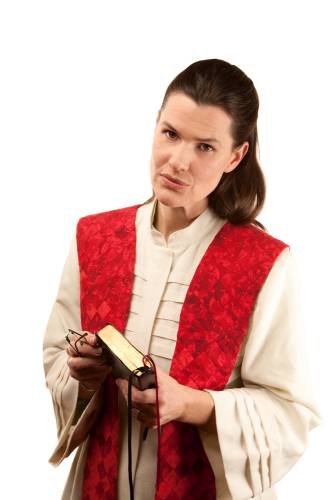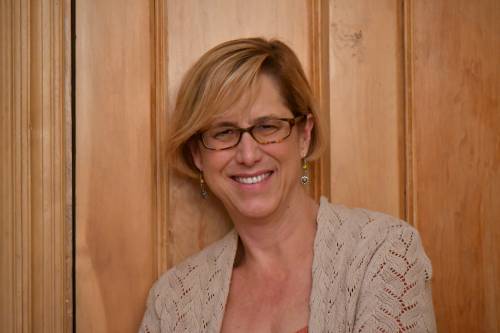Can We Talk About Sexism?
In #metoo conversations, the church can do better
by Susan Rothenberg

Here’s a statistic that you may or may not find startling. A study by PC(USA) Research Services in 2016 revealed 84% of female teaching elders have experienced discrimination, prejudice or harassment based upon their gender. Yet, 48% of male respondents did not believe that gender inequality is a problem.
That disconnect may explain why women are more comfortable talking about our #metoo experiences on social media than in church. Statistics, as well as our shared experiences as women leaders in the PC(USA), suggest our stories will not be believed or will be shouted down by those who see us as unreliable, overly sensitive, pushing a “feminist” agenda or, worst of all, at least a little culpable.
But don’t take my word for it. Here are some verbatim quotes from the same 2016 survey:
- “Many women are trying to swing the pendulum the opposite direction beyond equality to superiority.”
- “Women on an agenda are quite off-putting to other women, men and congregations in general.”
- “Many women look for a fight that doesn’t exist in many cases.”
- “Some use gender as an excuse for their ineffectiveness in ministry. Others spend too much time on surveys and trying to make issues more important than the work of the church.”
I could throw out a whole bunch of statistics in addition to these, but you only need to look around the PC(USA) to know that women, though they represent the majority of church members, are still terribly underrepresented in the pulpit, particularly in full-time, installed positions or senior pastorates. Believe it or not, there are still many Pastoral Nominating Committees (PNC) and sessions who will not, under any circumstances, call a woman as their pastor even as they reluctantly fill out the Equal Employment Opportunity worksheets for their Commission on Ministry (COM) and have the obligatory interviews with women and other minority candidates they have no intention of calling. As a COM chair, I have witnessed this attitude expressed in both subtle and not-so-subtle ways.
We can do better. Can’t we?
One of my PC(USA) brothers in Christ recently posted this article from CNN on social media: http://www.cnn.com/2017/10/21/opinions/what-men-can-do-me-too-stamp-opinion/index.html. The essay, written by Nicole Stamp, suggests specific actions which decent men (and women) can take to create a culture of safety, respect and equal opportunity for all. At the risk of being “off-putting,” I’ve adapted a couple of the suggestions to relate more specifically to church life.
Practice this phrase: “That’s not cool.” If you are serving on a PNC or another church council, speak up clearly when you hear people deliberately exclude women or other minority candidates for leadership positions. I was talking recently with a COM colleague from another presbytery who said she has called out PNC’s more than once, telling them that the PC(USA) has been ordaining women as ruling and teaching elders since 1956, and if they’re not comfortable with that, they might be more comfortable in another denomination. While I admire her bravery, I don’t know if you want to toss people out on their ear, but you do want to make sure folks on your PNC and/or council are open to female and other minority leadership. If they have objections to anyone but a white man in leadership, they probably aren’t people who should be in decision-making positions in the PC(USA). Period.
Read female theologians. Depending upon when you went to seminary (if you’re a pastor) or grew up in the church, it is entirely possible you got through without reading much or any theology written by women. Here’s a link to a list of women who have contributed to Christian thought through the ages and including present day scholars. https://maggidawn.net/2015/08/11/there-are-no-women-on-my-theology-bookshelf-2/ There are probably hundreds more incredible women missing from this list, but it’s a start.
Amplify women’s voices. If a woman’s contributions at a meeting or other church gathering are being dismissed, interrupted, or claimed by others, speak up. You could interject, “That’s exactly the point Susan was making,” or “That’s what Susan said.” If you are a moderator of a council, you have a particular responsibility to tune your ears and listen for how women are being heard or not heard.
Be mindful of how you introduce women. When you introduce a female colleague, use her formal title – “Reverend,” or “Reverend Doctor,” or “Doctor,” or whatever title she has earned, including her job title if appropriate. And don’t mention her appearance — “And this our beautiful new pastor, Susan.” When you introduce me, “Reverend Susan Rothenberg, blogger extraordinaire,” will do just fine.
Don’t call her sweetie. Or honey. Or young lady. Or kiddo. Seriously. Just don’t. She has a name. Use it.
Teach older members of your church to do better. In my first call where I was the first female pastor in the congregation’s history, I had many dear older men and women in my congregation who just didn’t seem to know better. Often, they made inappropriate comments about what I wore or how I looked, and told the occasional sexist or racist joke. Although it was difficult, I corrected them lovingly. Although pastors bear responsibility to create appropriate boundaries, church leaders need to take seriously their role in creating safe culture for everyone.
Accept discomfort. Talking about sexism in the church isn’t much easier than talking about racism, and it won’t always feel good. The wonderful thing about the #metoo movement is that it has inspired long overdue conversations in our culture about sexual harassment, assault and discrimination. These conversations must also happen in our denomination at every level.
Why does all of this matter so much? The Brief Statement of Faith tells us:
“In a broken and fearful world
the Spirit gives us courage…
to unmask idolatries in Church and culture,
to hear the voices of peoples long silenced,
and to work with others for justice, freedom, and peace.”
The church must be courageous enough to faithfully wrestle with how we receive the voices of women and other minorities who have been harassed, harmed and marginalized in our midst. Not because they are our mothers or wives or daughters or sisters, but because they are beloved Children of God with enormous gifts of the Spirit to offer the People of God in our congregations and councils.
The church as a place of respect and care for all of God’s people. Is this your prayer? #metoo!!
 Susan Rothenberg is a leader in the Unglued Church Project and an at-large member of Pittsburgh Presbytery. She has served as pastor to a small church in Pittsburgh, and currently co-moderates the presbytery’s Commission on Ministry and serves on the Anti-Racism Transformation Team. She also serves as a consultant with PneuMatrix. Prior to entering ordained ministry, she worked in marketing, advertising and public relations. She has one husband, two children, and two crazy cats. The opinions she expresses are entirely her own, so if you disagree with her, do not blame Pittsburgh Presbytery.
Susan Rothenberg is a leader in the Unglued Church Project and an at-large member of Pittsburgh Presbytery. She has served as pastor to a small church in Pittsburgh, and currently co-moderates the presbytery’s Commission on Ministry and serves on the Anti-Racism Transformation Team. She also serves as a consultant with PneuMatrix. Prior to entering ordained ministry, she worked in marketing, advertising and public relations. She has one husband, two children, and two crazy cats. The opinions she expresses are entirely her own, so if you disagree with her, do not blame Pittsburgh Presbytery.